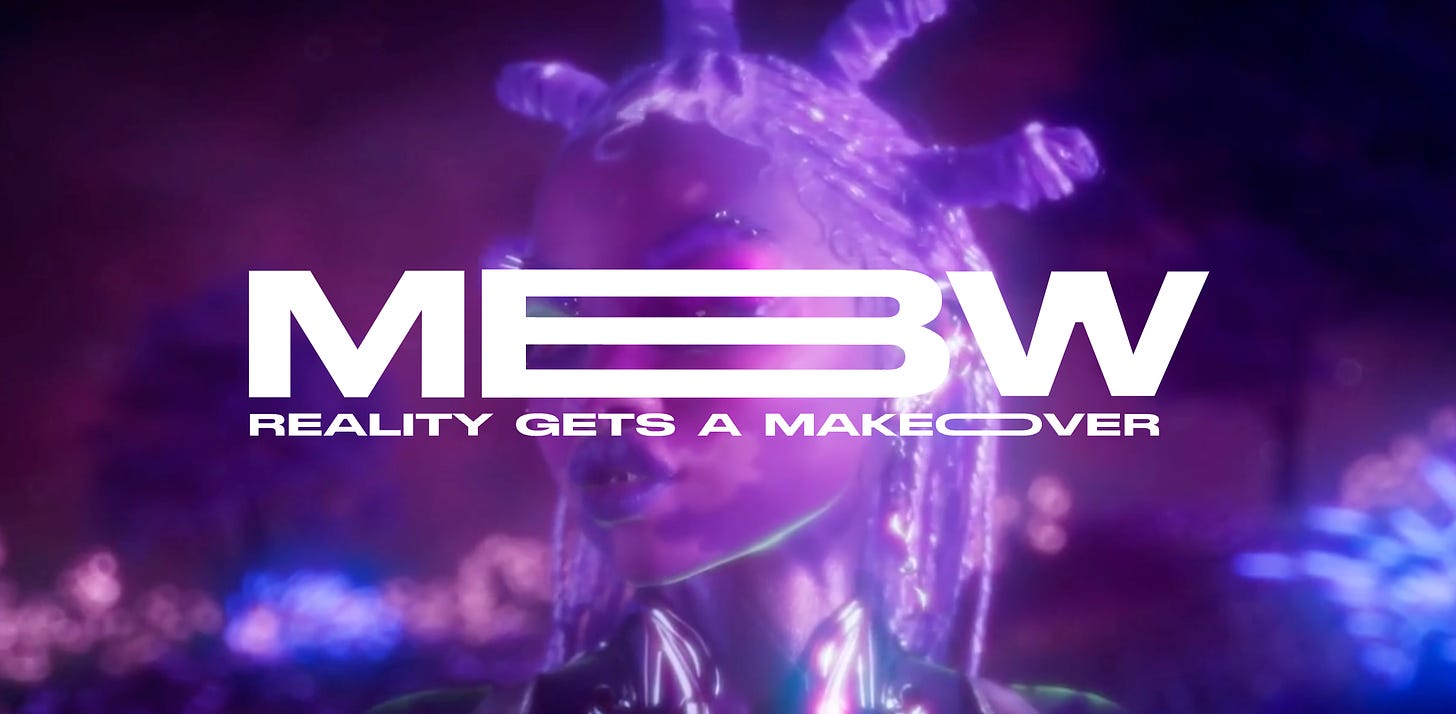This week is Metaverse Beauty Week. Metaverse Beauty Week feels like satire. The tagline for the digital festival is “Reality Gets A Makeover” — an apt description of the feminine beauty ideal. The experience, Forbes reports, will be “gamified with rewards offered on the completion of tasks” — essentially how beauty culture operates. It’s sponsored by a creative agency called CULT — I probably don’t need to elaborate there.
Alas, it is not satire. It is as real as an intangible internet universe inhabited by cartoon avatars attending presentations on “virtual aesthetics” from Neutrogena and the “metaverse’s biggest bath bomb” from LUSH can be. According to Cat Turner, CCO of CULT and co-founder of MBW, the goal of the event is to encourage “escapism” (see: dissociation) while “challenging beauty standards” (to be more inhuman and unrealistic).
If you’re looking for insight into how the metaverse might affect our cultural understanding of beauty from sources that don’t stand to profit from the fallout, I suggest skipping Metaverse Beauty Week in favor of a *~Metaverse Writing Retrospective~* from The Unpublishable. It’s more of a collection of content than a digital beauty conference — but at least it won’t push you to purchase virtual “lipstick” for your profile pic.
1. “Meta Face Is Coming” (Nov 2021)
If Instagram Face is modeled after real faces augmented with fake features, Meta Face will be modeled after fake faces… period. Lifelessness is the starting point. It’s reasonable to assume that IRL Meta Face will evoke the aesthetic of computer animation: bright eyes, featureless skin, rounded noses, pink cheeks, stiff hair, defined hairlines. The overall effect is smooth and slightly cartoonish — doll-like, even — in a tech industry interpretation of the ultimate beauty ideal: youth.
And oh, does the tech industry idealize youth. The obsession goes far beyond the obviously “enhanced” features of leaders like Zuckerberg, Jeff Bezos, and Elon Musk; all of whom look younger (albeit weirder) today than they did 20 years ago. A Guardian report from 2014 described Silicon Valley at large as a “youth cult” that pushes 30-somethings to take “extreme measures to overcome the sector’s ageism.” “Ageism in Silicon Valley Is Causing an Uptick in Plastic Surgeries,” declared TIME Magazine the same year. In 2020, a Washington Post investigation highlighted the appearance anxiety of an average Silicon Valley employee: “His ultimate fear: being banished to the cultureless provinces, unemployed and alone, with the rest of the saggy-skinned suburbanites.”
This anxiety doesn’t stay in Silicon Valley. When the pressure to override the most basic traits of one’s earthly existence — aging, emotion, expression, reaction — is forced upon those with access to the most cutting-edge advancements in social technology, it’s forced upon all.
2. “Cyborg Skin” (Jan 2023)
In 2023, I predict that the skincare industry will continue to push consumers further from the purpose of life — AKA being fully present in your one wild and precious human body — with “cyborg skin,” the futuristic follow-up to 2022’s “jello skin” and “glazed donut skin”. Inspired by Metaverse avatars, AI art, and the democratisation of photo-editing software, cyborg skin will seek to flatten any and all signs of life (wrinkles, pimples, pores) into a one-dimensional approximation of perfection: skin with no deviation in tone or texture, finished with a screen-like sheen… perhaps courtesy of more “NASA-backed” skincare devices promising to “optimize” human existence? The look marks a cultural shift from self-objectification (emulating inanimate foodstuffs) to self-mechanization (emulating humanoid machinery).
3. “Worshipping At The Altar of Artificial Intelligence” (Dec 2022)
The language of “transformation” [Lensa AI] uses is similar to what you would hear in beauty advertisements, for sure. Like, transform your lashes with this mascara! But that's because a lot of the language that the beauty industry uses is borrowed from spiritual language. From centuries-old religious practices. The beauty industry has co-opted it, but the original promise of “transformation” was, you know, dedicating your life to the Lord or whatever religious institution was around at the time. And again, I do think that relates back to how beauty has always functioned! Let’s go back to the beginning and talk about makeup’s original purpose — for the ancient Egyptians, makeup was used as a form of worship. It was used in religious ceremonies. People wore it to reflect whatever traits they believed their gods and goddesses to have. The same idea is embedded in Christianity — you know, we’re all “made in the image of God.” Part of this urge within us, the urge to embody beauty, is still that: to reflect the image of your God. And yeah, if you look at the things we worship today, particularly in Western culture, we worship at the altar of Elon and Zuckerberg and Bezos, and we are reflecting that back into the world via “beauty.” I mean, I’m sure we don't think we're worshipping them a lot of the time! But when you think of worship in terms of sacrifice, I think it becomes really clear. Where are we sacrificing our time? Where are we sacrificing our energy? Where are we laying all of that down? On what altar? It’s the altar of artificial intelligence.
4. “Now I Am Become Slime” (Feb 2023)
It’s official: “Extraterrestrial” is the hot new dehumanizing beauty trend! Just after I wrote about Kim Kardashian’s alien-themed SKIMS campaign (and how it stems from the skincare industry’s obsession with “NASA-backed” technology and generally inhuman/inhumane appearance goals), makeup artist Isamaya Ffrench created the above looks for the Mowalola FW23 fashion show. The inspiration? The Dark Web, the metaverse, AI — a smorgasbord of tech innovations that encourage dissociation from the felt world and the felt body. Hey, that’s beauty, baby!!!
5. Miscellaneous Interviews
I’ve been interviewed for a handful of articles that investigate how artificial intelligence informs modern beauty standards, too:
“How AI Avatars And Face Filters Are Altering Our Conception Of Beauty” by Anna Haines for Forbes
“Beauty 3.0” by Mattie Kahn for Marie Claire
“Here’s why body-shaming in the metaverse is inevitable” by Kish Lal for i-D
“Lensa AI and the Trap of Otherworldly Beauty” by Emily Leibert for Jezebel
And if, after all of that, you’re still wondering why the beauty industry insists on framing the metaverse as some feel-good future of aesthetics, I think this graphic from Metaverse Beauty Week dot com says it all…






I feel like the metaverse is just adspace sold as transformative technology, not for the user (not that I, the user would desire to use the metaverse) but for the marketing team to create and grow and maximise.
The idea that we have gone so far as to create "beauty in the metaverse" is chilling - not only am I already being told that I should make an idealised version of myself on the web to escape everyday life (arguably I would only be escaping everyday life because day to day capitalism is so bleak), but within this "idealised" version of myself, I should also remember to reapply my virtual concealer.
It’s depressing in the extreme. I might be in favor of the metaverse more if it was actually an improvement on reality. Instead it seems even more dystopian than the rapidly disintegrating world outside my door. Who wants that?!